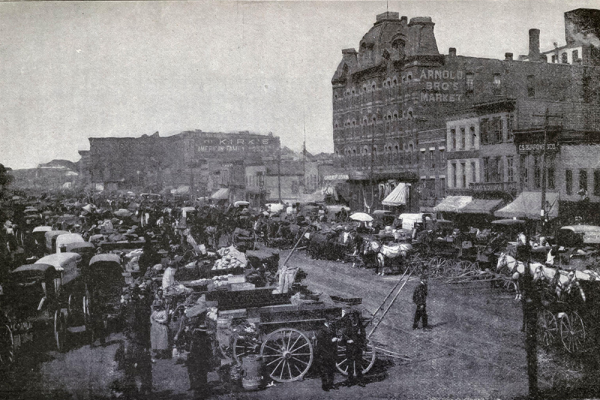“Dynamite or Gospel” was the choice that some Christian evangelists felt they were facing in 1885. According to The Record of Christian Work, a journal that chronicled the stories of U.S. evangelists like Dwight L. Moody and Charles Spurgeon throughout the late 1800s, evangelists believed they had to intervene in the lower classes, or else these classes could be persuaded to join the ranks of socialists and anarchists, therefore throwing off the stability of major U.S. cities like Chicago. These evangelists were right to worry.
Just a year later, in 1886, one of the most important moments of U.S. labor history took place on May 4 in Chicago: The Haymarket affair. The Haymarket affair started as a rally for an 8-hour workday in the midst of a general strike but it all went sideways when a still unknown person threw a bomb into the crowds, leading to an eruption of violence from both police and protestors.
Historian Timothy E.W. Gloege explains in his book Guaranteed Pure that before the events of Haymarket, Christian evangelist Dwight L. Moody conspired with local capitalists such as Cyrus McCormick Jr., one of the managing partners of International Harvester Company, to thwart the 1886 strike altogether. Within the story of the Haymarket affair, we can find a number of political tensions that are still within Christianity today. One major tension still animating Christian discourse is this: What happens when Christians side with the wealthy instead of the poor and working class?
Chicago, in the 1880s, was the eye of the storm for the struggle between business elites and workers in the United States. The radical energy from the destroyed Paris Commune (a short lived radical working class movement that seized power in Paris) nearly 10 years earlier had carried across the Atlantic and emboldened the rapidly organizing working class in the U.S. In 1884, just two years before the Haymarket affair, Chicago’s working class gave the city’s capitalists an ultimatum: Give workers an 8-hour workday by 1886 or face a general strike.
It is important to understand that the workers’ demand was a direct response to the antagonistic actions of Chicago’s capitalist class — specifically, long work hours and gutted wages. Cyrus McCormick Jr. cut the wages of his workers and reinvested those funds into the mechanization of labor, simplifying the skill of the workers he required, and subsequently widening his labor pool. As a result, he drove wages down and made major profits off the backs of disgruntled and exploited workers.
As the deadline of the general strike grew closer and worker organizing became more militant, the message of evangelizers like Moody began to resonate with Chicago’s capitalist class. Much of Moody’s evangelistic career focused on developing a strategy of preaching the gospel to the unreached and rapidly radicalizing working class communities.
Moody developed a strategy for training “Christian workers” to reach the working class in ways that mainline Protestant churches weren’t doing. At the time, mainline Protestant churches insisted that evangelism was best left to trained professionals with seminary educations. So to have Moody, a layperson, create a program that trained working-class people to evangelize others within their own socioeconomic class didn’t sit well with professional clergy. This approach, Moody believed, would assuage the threat of impending socialist and anarchist uprisings. Gloege suggests that the increasing militancy of radical working class movements created panic among evangelical elites and led to Moody doubling down on his strategy of engaging the working class; Moody decided to expand to the East Coast.
Yet a number of setbacks, like a lack of funding and the inability for Moody’s New York Christian workers to connect with the working class, led Moody to abandon his work on the East Coast, causing him to return to Chicago in early 1886 where he would try again to expand his evangelism work and establish a training institute for Christian workers. Moody’s pitch to Chicago’s capitalists was simple: Based on the overarching fears of a threat to the stability of the capitalist social order, Moody sought $250,000 from Chicago’s businessmen to open an institution that would train people to evangelize to the working class.
Moody argued that “Christianity has been on the defensive long enough,” and “The time has come for a war of aggression.” Facing pushback from mainline denominations, Chicago’s business elites were slow to take Moody up on the offer and, in the end, didn’t give him the funds. Instead, they proposed he hold a week-long revival in May of 1886 to thwart the coordinated labor action and general strike.
The first night of the revival was a flop, and Moody mostly preached to empty seats; he implored the women in attendance “to bring to the meetings the men who [were] on strike.” But Moody’s words went unheeded, and the following day, on May 3, a crowd of 40,000 workers assembled at the gates of McCormick’s factory to protest their unfair treatment. Police confronted the crowd and killed four strikers, injuring many more. The day’s events led to a call for a protest the following day at Haymarket Square. Moody’s revival had failed to reach the workers.
Despite the failed revival and the chaos in Haymarket Square on May 4, Moody used the situation to his advantage by placing himself in the spotlight. Moody told the Chicago Daily Tribune: “I am not speaking disparagingly of the different churches and missions now attempting to reach this class, but anyone with their eyes open can’t fail to see that the masses are not reached. One of two things is absolutely certain: either these people are to be evangelized, or the leaven of communism and infidelity will assume such enormous proportions that it will break out in a reign of terror such as this country has never known.”
These words were in no way a departure from Moody’s previous position, but as Gloege’s work concludes, “It was only Haymarket that opened eyes, ears, and wallets. He [Moody] secured $250,000 and a board of trustees consisting entirely of prominent businessmen. Moody would go on to found the Chicago Evangelization Society, which would then be renamed to the Moody Bible Institute after his death in 1899.”
The use of Moody’s socially conservative evangelism by Chicago’s ruling class is a drastic example of religion being used as an opiate to subdue the masses in the most vulgar sense. Yet many Christians today are not far from Moody’s stance that religion should produce docile and complacent working people who have their eyes on heaven, rather than struggling for the rights of the working class in the here and now.
Christian financial “experts” like Dave Ramsey or prosperity preachers like Joel Osteen are proof enough. Beyond just those figures, there’s a whole cottage industry within more conservative versions of Christianity that give ethical tips to businessmen and apply Christian teachings to be a good capitalist — at the expense of the life and dignity of workers. For example, in 2020, Dave Ramsey went out of his way to shill for Southwest’s CEO while disparaging union workers as being “stupid” for advocating that the company meet the terms of their bargained contract.
But the type of Christianity that is wielded by financial elites and capitalist shills is not the only Christianity possible. On May 1, what’s known across the world as International Workers’ Day, is a day that Christians should remember that Jesus himself was a carpenter, a worker, not one of the bosses. Jesus’ teachings tell us that it's easier for a camel to pass through the eye of a needle than for the rich to enter heaven (Luke 18:25). In a time when organized labor is once again on the rise and CEOs are fighting back, Christians must resist the ways CEOs, capitalists, and their fan clubs appropriate Christianity for the oppression of working people.
Got something to say about what you're reading? We value your feedback!






